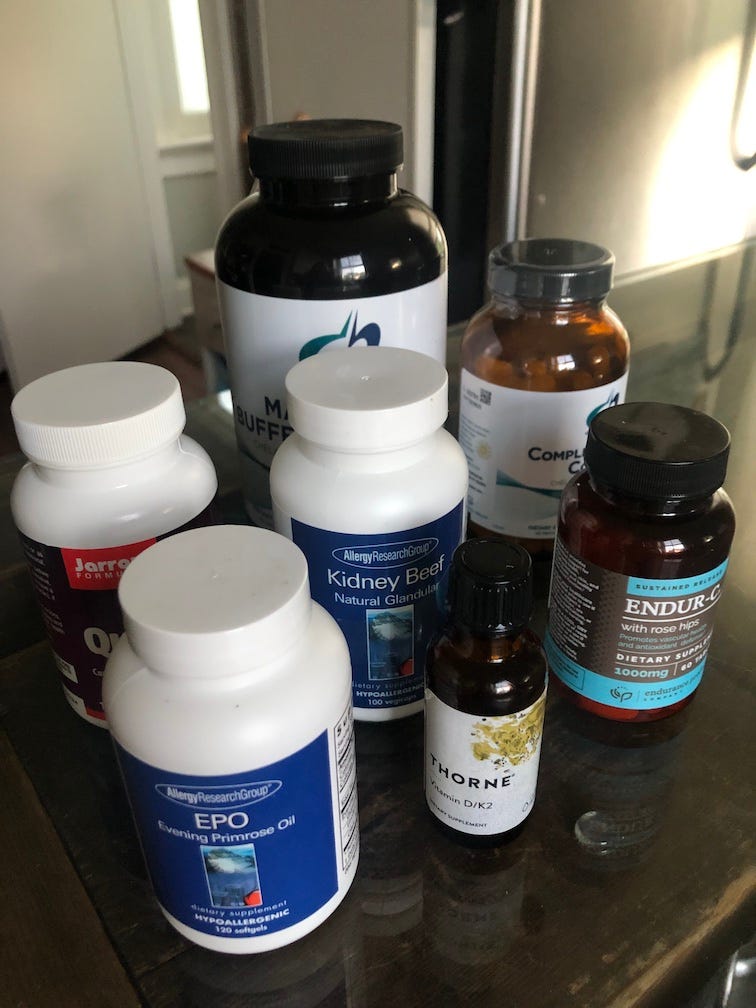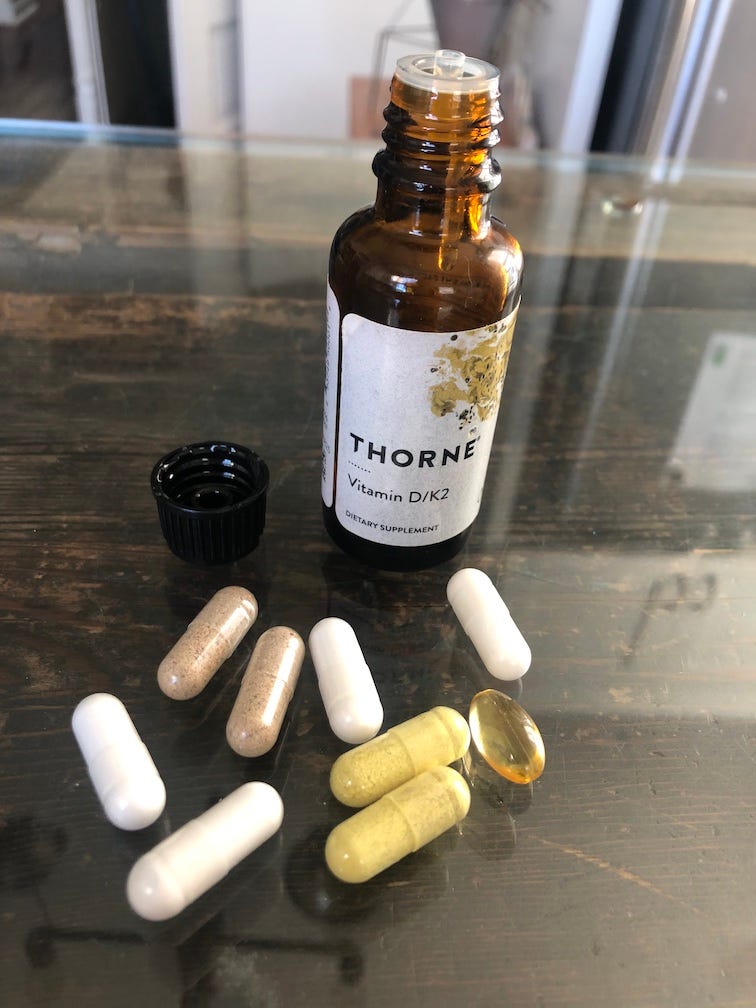The problem with herbal and dietary supplements
Drastic experiments around an autoimmune condition reveal all.
It has recently come to my attention that the supplements I’ve been taking on a routine basis in order to reduce symptoms of an autoimmune condition might actually be triggering those very same symptoms.
Nearly three years ago, a gastroenterologist diagnosed me with mast cell activation syndrome (MCAS, or ‘mast cell’), a complex autoimmune disorder. My treatment protocol includes a heavy handful of supplements I’m to take throughout each day: a multi-mineral, magnesium, vitamins C and D, quercetin, and beef kidney pills. Additionally, I’m supposed to take evening primrose oil supplements for one week per month, and every quarter, complete a course of the herbal supplement neem.
The problem with supplements is this: They all contain numerous lab-processed additives. The additives keep the contents of the capsules from clumping during manufacturing, form the capsules that house the powdered herbs and minerals, and actually grease the capsules for ease of movement through factory machines. They also preserve the capsules for long-term shelf storage.
Here’s a list of the inactive, “other” ingredients from just my suite of prescribed supplements above:
Cellulose
Microcrystalline cellulose
Hydroxypropyl methylcellulose
Vegetable wax
Vegetable stearate
Stearic acid
Silicon dioxide
Silica
Magnesium stearate
Medium chain triglyceride oil
Mixed tocopherols
MK4
L-leucine
Gelatin
Glycerin
By the time I got that diagnosis in 2020, I’d already been down every other rabbit hole in my “health journey.” I’d practiced yoga, meditation, and other movement and mindfulness techniques. I’d tried vegetarian, gluten-free, dairy-free, sugar-free, soy-free, histamine-free, paleo, the Whole 30, and even the “taste-free” diet. (OK, that last one is just sarcasm.)
I also now realize, with some measure of alarm, that I’ve taken one supplement or another my entire adult life, and prior to that, I’d been raised on Flintstones and other vitamins.
That left me with a critical question: Could the supplements be doing more harm than good?
Part of what led me to this question is the fact that when I began the new protocol in the fall of 2020, I also made a huge, new change in my diet, this one different: I focused on eliminating food additives. Now I’ve never been one for fast food or processed food, but you’d be surprised the lengths you need to go to these days to eat clean.
I wrote about the many additives in “dairy” products in this post:
Look at any alternative-milk label, and you’ll see what I’m talking about. They’re all loaded with additives to make the oat, hemp, or nut-of-the-week behave like the milk from an animal.
I’ve also had acupuncturists prescribe protein cleanses in the past, by the way, and those protein powders always kick up mast-cell reactions for me with a vengeance. They’re full of additives; yes, even when they’re so-called “organic.”
So when my quality of life began to dramatically improve three years ago, was it truly from the treatment protocol, or was it from reducing the number of additives in my diet?
Over the past few years, my symptoms never entirely diminished, but they reduced down to 50 to 30 percent what they had been. It’s been a relief not to feel as if every meal is a risk. At one point prior to the diagnosis, I was subsisting on a diet of pear, lamb, and rice, the only foods that didn’t seem to trigger mast cell.
The only time I feel 100-percent normal is when I’m literally starving.
While the symptoms lessened, I continued to need to treat with Pepcid and Allegra a couple of times per week and sometimes every day. I also noticed that every three to six months, major symptoms would flare up again. It would take not just that quarterly course of neem but a two- or three-day fast to knock them back down. As I recently mentioned to a family member, “The only time I feel 100-percent normal is when I’m literally starving.”
This three-year experiment strongly suggests additives play a major role in MCAS.
One piece of evidence: Restaurants are a particular problem for me, as I can’t control what ingredients they’re using back in the kitchen. Even if I order a meal made from scratch, the chef might grease the skillet with an additive-laden cooking spray or margarine instead of butter. “From scratch” might be interpreted to mean the restaurant chain’s shelf-stabilized-from-additives secret sauce is totally OK.
It took a three-day fast this summer to lower inflammation and reduce symptoms. When I fast, I also stop taking supplements, as they’re hard to digest without food and trigger severe nausea and other digestive reactions on their own. As soon as I resumed supplements but kept avoiding other additives, the symptoms returned. So that’s possibly another piece of evidence to suggest additives play a major role in MCAS.
This year, mast cell has been a lot harder for me to control. Granted, I’ve been under a mountain of stress from the tech crash, having to lay off my entire staff at the game studio and reverting to a solo shop. (It’s lonely, people, let me tell you.) But is that the only reason? And if stress plays that much of a factor above and beyond the protocol, why am I spending so much money on pricey supplements when I could focus on stress-reduction techniques instead? I could buy a week at a tropical retreat for the price of all those capsules!
Armed with the above knowledge, I decided to see what life is like without supplements. I resumed my normal, additive-free diet and stopped taking all supplements as well.
I immediately felt better in the first few days. But that was too early to call it.
After the first week, a strange thing happened: My mouth itched severely, and my tongue and taste buds swelled. Itching in the roof of my mouth is an MCAS symptom, but this irritation was next-level, and the swelling was entirely new.
I know that some of the additives in the bulleted list above are manufactured free glutamates, similar to monosodium glutamate. They work by tricking your brain to perceive more “taste” in your food than is actually there. That’s part of why people get addicted to fast food and processed food. It doesn’t actually taste better, but we’re fooled into thinking it does.
These additives activate receptors in your mouth and on your tongue, so my strange reaction seems to make sense in that case. Perhaps this was the moment the additives were leaving my system, after years of buildup. In a few days, my symptoms completely cleared.
It’s now been more than three weeks since I stopped taking supplements. As long as I can cook for myself and stick to a whole-foods diet without additives, my symptoms continue to decrease.
I’ve also turned more toward food medicine to replace the elements the supplements were supposed to supply. For example, goldenrod tea, red onions, and capers are a great source of quercetin. Instead of beef kidney pills, I grow a steady supply of pea shoots in jars on my kitchen counter for the diamine oxidase, which has been shown to break down the histamine associated with mast-cell flareups. Eggs, fish, and shiitake mushrooms are natural sources of vitamin D. So is getting plenty of sunshine.
While I’m still in the experiment phase here, I see little incentive to resume taking all those supplements when they seem to make little difference and might actually trigger mast-cell responses. There’s also the question of the long-term effects of taking supplements in such gargantuan quantities. As this BBC reporter points out, there might actually be negative outcomes.
Even if they’re not actively harmful, are they even helpful? I would need to eat something like eight red onions a day to equal the amount of quercetin in my recommended daily dose. Is the body really able to absorb and assimilate that much quercetin in powdered form?
The cornerstone of my treatment protocol is a pharmaceutical called low-dose naltrexone (LDN), which has been used to treat autoimmune conditions like mine with great success. So that’s still a wild card here. Do I need to continue taking LDN if I’m adhering to a strict, no-additives diet? Do the additives in the LDN pills themselves trigger mast cell? Bottom line, am I better off with or without LDN?
I’ll continue exploring these questions and let you know as I reach conclusions. Does any of this resonate with you? I’d be interested in your experiences, your own health journeys. While I’m not looking for advice on diets, supplements, Rx, or other recommendations, as I’ve been there and done all that, I’d love to hear your stories.
My pea-shoot regimen was sparked in part by my own herbalist’s suggestion—the brilliant Amanda Jokerst, owner of Forest + Meadow—and by a discussion in a Slowdown Farmstead paid-subscriber chat. Shout-out to Tara for giving me the push to ditch the kidney pills. She had her own reason, which is to question the wisdom of regularly ingesting the organs of multiple animals who’ve been raised in who-knows-what conditions. It’s a good thing to question.
I’ll end by making another observation about my supplement fast so far: It’s been oddly scary and liberating not taking supplements with every meal. The first week, I kept instinctively reaching for them where I usually keep them in a tiny bowl by the side of my plate. So something about this is psychological, too; while I’ve never been addicted to anything in my life, there’s a touchstone mechanism in effect here, as if the supplements themselves became a sort of food talisman that I perhaps magically believed in, and once they were gone, the absence was palpable. In time, I hope this becomes more freeing than frightening.






Thanks for all the comments so far! This seems to have touched a nerve. Any theories as to why?
My mom takes a million supplements,,,and then goes to Walmart and buys some of the cheapest food she can find. She has it backwards, and it is not helping her physically, though it seems to give her some sense of security. One of the reasons I have such a big garden, so I have access to as much whole food veggies as I can eat. That and wild venison and fish. Living with my parents, I also buy food, especially high quality, local dairy, eggs and meat.
Supplements are mostly to make people who are chronically ill feel like if they didn't take supplements they would be dead.